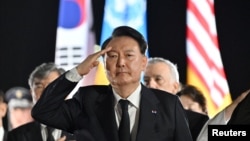South Korea’s increasingly outspoken stance on issues such as Taiwan and the South China Sea is exacerbating tensions between Beijing and Seoul.
South Korea recently pushed back against Chinese criticism of Taiwan’s participation in a democracy summit that ended in Seoul on Wednesday. Taiwan’s Digital Affairs Minister Tang Ao spoke virtually on Monday to discuss the risks posed by cyberattacks to global elections.
South Korea’s Foreign Ministry spokesperson Lim Soo-sook said at a press conference on Tuesday that the event was held to “strengthen democracy” and was “not intended to target a specific country.” Lin went on to say that South Korea’s one-China policy has not changed.
Chinese Foreign Ministry spokesman Lin Jian told a news conference on Monday that Beijing “firmly opposes South Korea’s [Republic of South Korea] Invite the Taiwan authorities” to attend the event.
At a press conference earlier on March 12, Chinese Foreign Ministry spokesperson Wang Wenbin urged South Korea not to take a stance against China on the South China Sea issue and avoid adding unnecessary burdens to bilateral relations.
He went on to say that Seoul “changed the cautious neutrality position it has maintained for many years and has repeatedly hinted at or accused China on the South China Sea issue.”
South Korean Prime Minister Lim said at a press conference on March 7 that Seoul was “deeply concerned” about Chinese coast guard ships using high-pressure water cannons to attack Philippine ships, an action that “exacerbated tensions in the region.”
Lin’s comments were welcomed in Taiwan, where Taiwan’s foreign ministry expressed “appreciation and gratitude” to countries such as South Korea for expressing concern about the situation in the South China Sea, spokesman Jeff Liu told VOA via email this week.
He went on to say that Taiwan “supports freedom of navigation and overflight in the South China Sea.”
Regarding Taiwan’s participation in the summit, Liu told VOA that opposing Taiwan has become “China’s standard response” whenever Taiwan is “active, prominent, recognized or respected internationally.”
China considers the self-ruled island of Taiwan to be its own territory.
Patrick Cronin, chairman of Asia-Pacific security at the Hudson Institute, said China wanted to remind Seoul not to become “overconfident” in its rhetoric, but Beijing had learned to avoid applying pressure “which it knows is counterproductive.”
He recalled that when South Korea installed the US Terminal High Altitude Area Defense System (THAAD) in 2017, Beijing responded by suspending Chinese group travel to South Korea and closing the Korean Lotte supermarket chain in China.
Cronin noted that the Yoon government in Seoul has announced its desire to play a more central role in the global fight for freedom and values-based diplomacy.
South Korean President Yoon Seok-yeol said in the preface of the “Korea National Security Strategy” released in June 2023, “As a global hub country in the spirit of freedom and solidarity, the Republic of Korea is committed to actively responding to the rapidly changing security environment.”
Compared with his predecessor Moon Jae-in, Yun has been more outspoken in defending Taiwan and opposing China’s authoritarian behavior in the South China Sea.
In an interview with Reuters ahead of a state visit to Washington in April 2023, Yin expressed opposition to attempts to use force to change the status quo between China and Taiwan. Days later, Chinese Vice Foreign Minister Sun Weidong said Yin’s remarks were “completely unacceptable.”
In November, before his state visit to London, Yin emphasized the importance of maintaining a rules-based order in the South China Sea and peace and stability in the Taiwan Strait.These remarks occurred during an interview telegrapha British newspaper.
Daniel DePetris, a fellow at Defense First, a Washington think tank, said Seoul’s verbal defense of the Philippines was “noteworthy” not only for what it said about its relationship with China but also for what it said about China’s smaller neighbors.
He said in an email to VOA on Tuesday that Seoul’s comments showed that “small and medium-sized countries surrounding China are deepening their own security and political relations to better balance China’s power.”
Robert Manning, senior fellow at the Stimson Center’s Reimagining American Grand Strategy program, told VOA via email on Wednesday that China’s comments urging Seoul to avoid adding unnecessary burdens to the bilateral relationship “appear to be a thinly veiled threat to Responding to the West’s consistent pro-Western stance.” The Yin administration’s attitude is not only on the South China Sea issue, but also on global issues such as Ukraine. “
Jingxun Li of VOA’s Mandarin Service contributed to this report.
Follow us on Google news ,Twitter , and Join Whatsapp Group of thelocalreport.in
